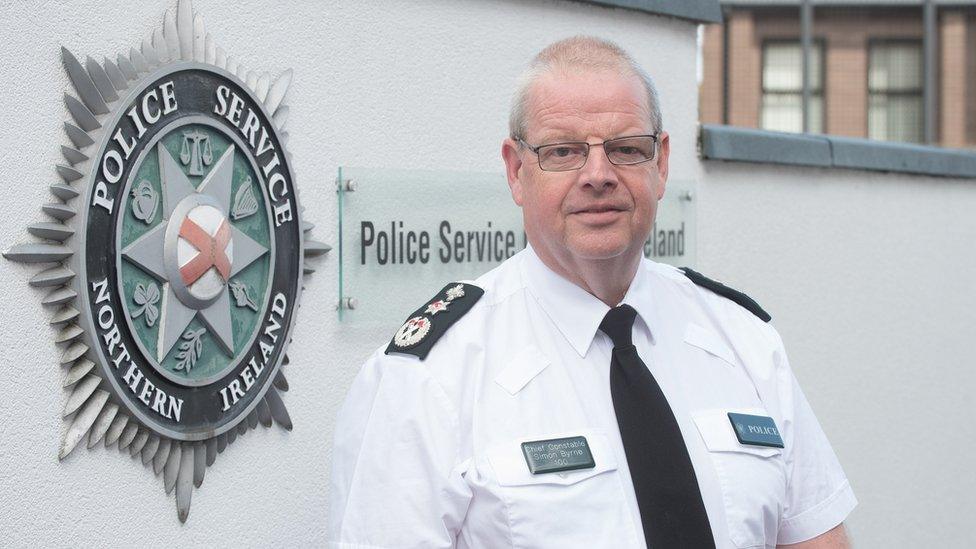PSNI review: Chief constable says police 'not removing memorials'
- Published
Simon Byrne says the PSNI will not be removing police memorials and "never have been"
The PSNI chief constable has reiterated that there will be no removal of memorials to murdered officers.
Simon Byrne made the comments during a meeting of the policing board amid a backlash from unionists over a review of policing in south Armagh.
There have been fresh calls for Mr Byrne to resign following the publication of the review.
It contained 50 recommendations, external, including the closure of Crossmaglen police station within five years.
It also recommended "exploring" the relocation of police memorials in south Armagh stations.
Mr Byrne told the policing board on Thursday that "in relation to memorials, we are not removing memorials and never have been".
"We will not be progressing this element of recommendation six, however, with police station closure and redevelopment comes an inevitable requirement to consider how best to manage the transition of memorials and honour our fallen colleagues," he added.
"When this time comes, this will be handled properly and with sensitivity, with full consultation with the families of those who were murdered delivering policing in south Armagh.
"Far from disrespecting or forgetting our 30 colleagues who paid the ultimate price, I think we can do better than what we currently have in place and over the horizon plans for a new police museum may reflect this."
The chief constable also said that "neither the review nor the police service at any time has considered or envisaged all-island policing structures".
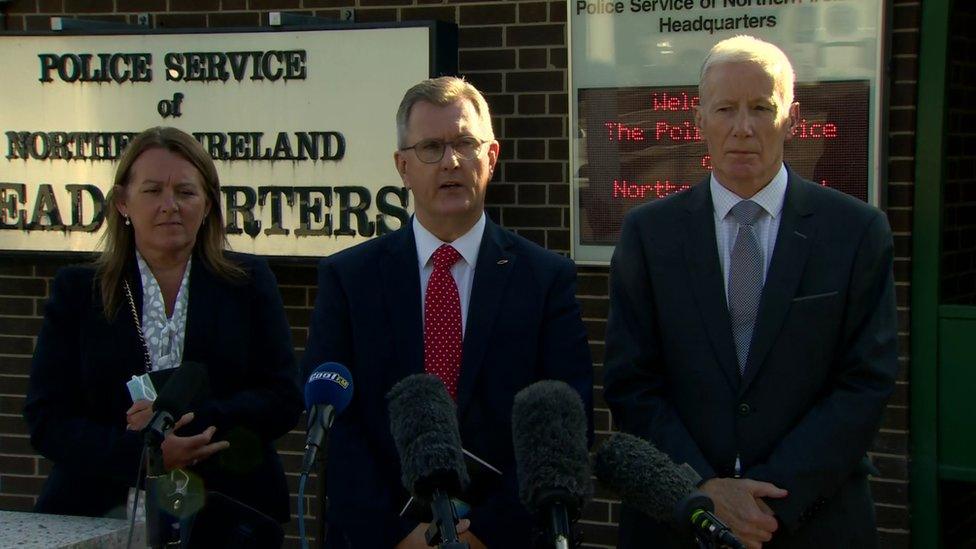
Sir Jeffrey and his colleagues spoke after the meeting, which he described as "frank"
"In terms of cross-border policing, let me be categorically clear on this issue - wording within the report has been misunderstood," he said.
Mr Byrne also insisted he has no intention of resigning.
On Wednesday evening, Mr Byrne had released a statement saying there would be no removal of memorials to murdered officers "from any operational stations."
But he said if the plan to close Crossmaglen station went ahead, the issue of a memorial within the building would have to be addressed.
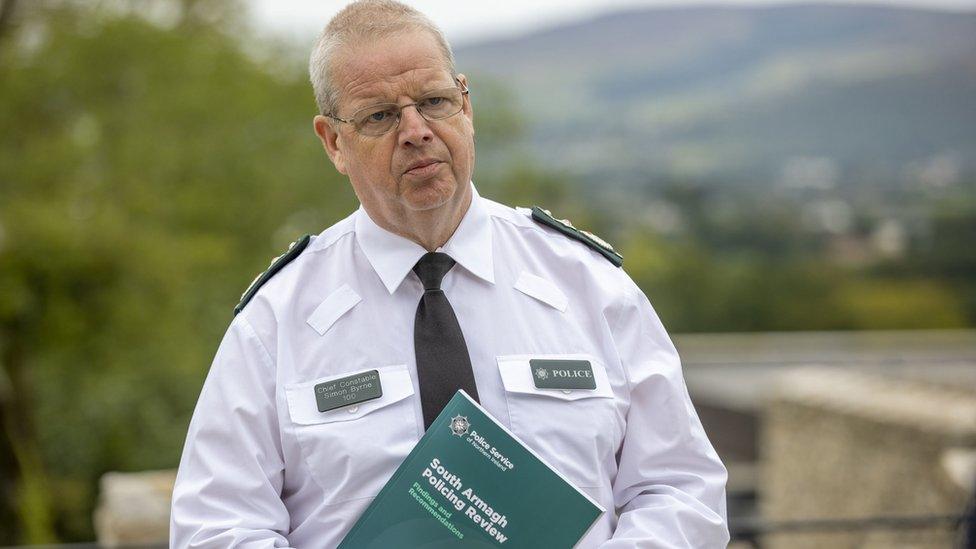
Simon Byrne has faced fresh calls to resign following the publication of a report into policing in south Armagh
The chief constable also had talks with DUP leader Sir Jeffrey Donaldson on Thursday.
Speaking afterwards, Sir Jeffrey said it had been a "frank" discussion, but he stopped short of calling for the chief constable's resignation.
He said that Mr Byrne's handling of the report had been "the latest in a series of events which have undermined confidence, mainly in the unionist community".
"We support the rule of law but we are concerned about the loss of confidence in policing in the communities we represent and we made that clear to him," he told BBC News NI.
"We cannot continue like this, where every other week we face another crisis and another debacle which eats away, undermining the confidence of ordinary people in the way that Northern Ireland is policed," he added.
In relation to the report, he said there were elements of it which were "unacceptable" and the chief constable had been asked to clarify how it will be taken forward.
Sir Jeffrey's party colleague, Economy Minister Gordon Lyons, has called on Mr Byrne to resign, as has the TUV.
Allow X content?
This article contains content provided by X. We ask for your permission before anything is loaded, as they may be using cookies and other technologies. You may want to read X’s cookie policy, external and privacy policy, external before accepting. To view this content choose ‘accept and continue’.
On Thursday DUP MP for East Antrim Sammy Wilson also called for his resignation claiming the chief constable had "lost all credibility."
"He has caused hurt to the families of those officers killed in the line of duty," he tweeted.
"He is intent on creating all Ireland policing structures without political or community consent," he added.
TUV party chairman Jordan Armstrong accused the DUP of being "all over the place" on the matter.


Politicians like to avoid backing themselves into a corner.
That might explain Sir Jeffrey choosing his words carefully about Mr Byrne's future.
He's conscious of the problems it presented for his predecessor Arlene Foster when she demanded the chief constable's resignation in April.
While there may have been a tense exchange between the DUP and Simon Byrne at today's meeting, the fact the DUP leader appears to have rowed back may mean an easing of pressure on the chief constable.
But Mr Byrne will still be conscious that relations with unionist parties remain in a difficult space.

On Thursday, the Tánaiste (Irish deputy prime minister) Leo Varadkar was asked about the political fall-out over the review of policing.
He said he had discussed it during his meeting with Northern Ireland Justice Minister Naomi Long.
"Policing in Northern Ireland is an internal matter - I am in favour of further co-operation between An Garda Síochána and the PSNI, but I don't envisage the gardaí patrolling parts of Northern Ireland or the PSNI policing parts of the Republic - I'm not even sure that's what was envisaged in the report," he said.
Mr Varadkar added that he believed the issue had been "a bit overstated".
'Relatively inexperienced'
Former PSNI Ass Ch Con, Alan McQuillan, who previously served as an inspector in Crossmaglen in the 1980s, said on Thursday that he believed the memorial issue had been "mishandled".
"It should have been recognised from the outset that that would be a problem and they should have looked at that and realised that that would have been one of the major issues that people would focus on," he told BBC News NI.
"Especially in a situation where you have the DUP under such political pressure within their own community."
He also said he believed there was a "fundamental issue about the command team in PSNI" which he said was "relatively inexperienced historically".
Crossmaglen, in south Armagh, has one of Northern Ireland's most fortified police stations.
During the Troubles, south Armagh was one of the most dangerous areas to police due to IRA attacks - in 1975 the then Secretary of State Merlyn Rees labelled it "bandit country".
It led to heavily-fortified security installations and watchtowers being built, many of them by the Army.
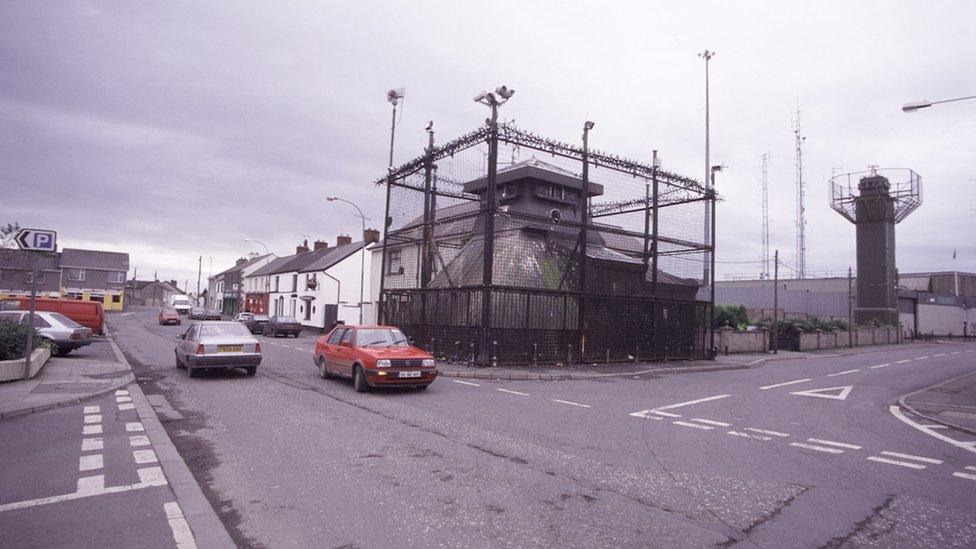
Pictured here in 1999, Crossmaglen police station is Northern Ireland's most fortified police station
An estimated 2,400 bombings and shootings took place in south Armagh between 1970 and 1993.
But today the threat level is lower than other areas.
Of 53 security-related incidents in Northern Ireland last year, none was in south Armagh and the last terrorist incident recorded was in 2015.
The DUP has previously called for the chief constable's resignation over the PSNI's handling of the Bobby Storey funeral last year.
Ulster Unionist Party leader Doug Beattie, who served in Crossmaglen in the 1980s and 1990s, said the report was a "PR disaster".
However, Finance Minister Conor Murphy of Sinn Féin, defended the report, saying it was about "building a better relationship with the community".
The SDLP leader, Colum Eastwood, said the leaders of political unionism should not be making resignation calls.
Justice Minister Naomi Long said other political parties should "move back" from calls for Mr Byrne to resign.
The chairperson of the RUC George Cross Widows' Association, Thelma Corky, welcomed the statement from Mr Byrne confirming that there would be no removal of memorials to murdered police officers.
However, she said she would be sending a letter on behalf of her members to the chief constable to "express her concerns about the hurt and annoyance his comments have caused among RUC widows".
- Published1 September 2021
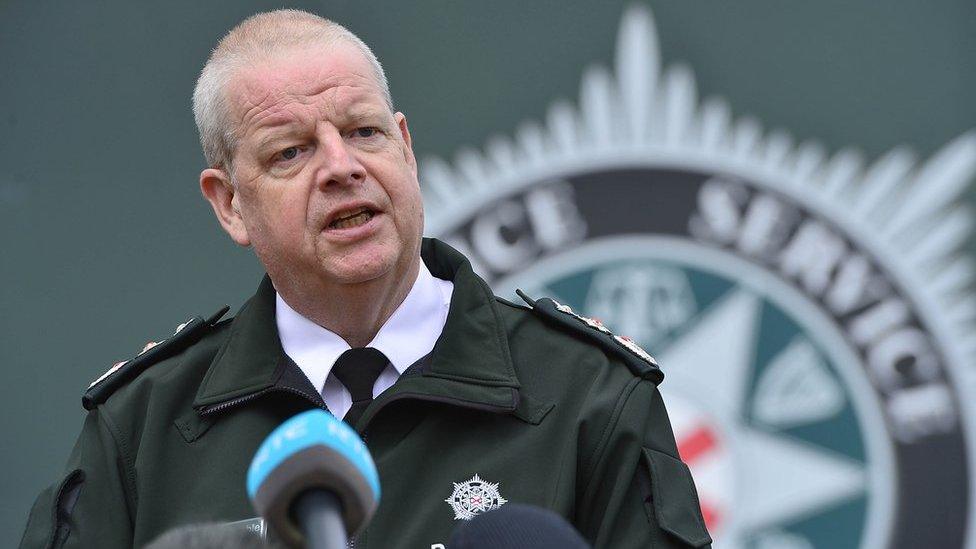
- Published31 August 2021

- Published7 January 2020
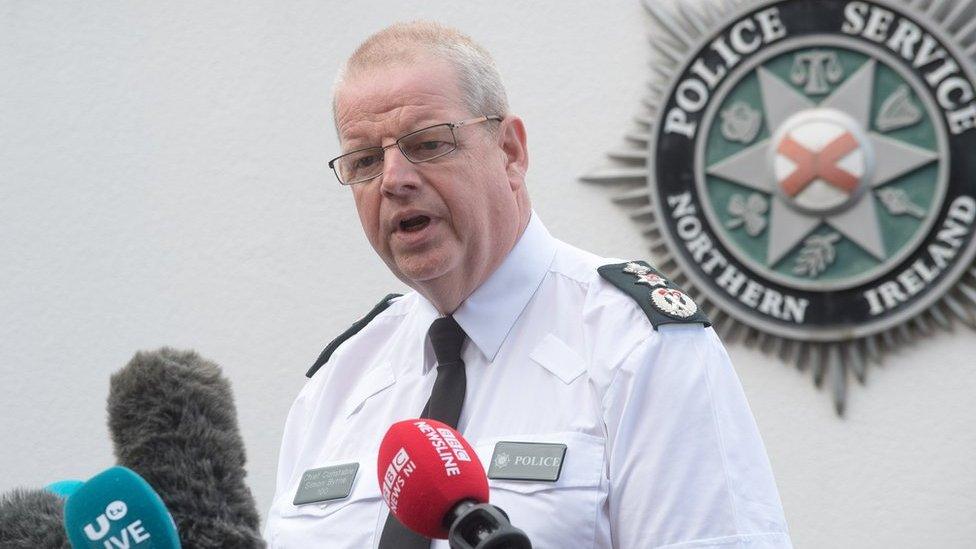
- Published26 December 2019

- Published30 August 2023
